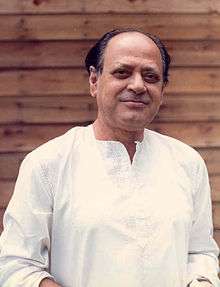Abhi Bhattacharya
Abhi Bhattacharya (1921–1993) was an Indian actor of Hindi and Bengali cinema, who is most remembered for his roles in films of the 1950s and the 1960s, such as Yatrik (1952), Jagriti (1954), Anuradha (1960), and Subarnarekha (1965). In his career, he worked with film directors such as Ritwik Ghatak, Guru Dutt, Bimal Roy, and Satyen Bose.
Abhi Bhattacharya | |
|---|---|
 Bhattacharya in 1984 (Boulder, Colorado) | |
| Born | 1921 British India |
| Died | 1993 (aged 71–72) |
| Occupation | Actor |
| Years active | 1947–1993 |
He made his film debut in 1947, with the Bombay Talkies film Noukadubi, based on a novel by Rabindranath Tagore, and directed by Nitin Bose.[1] Later in life, around 1971, he turned to spirituality, through his association with Dadaji (whose name as a householder was Shri Amiya Roy Chowdhury). He wrote a book, narrating his realisations from experiences with Dadaji, titled Destiny with Dadaji.[2] Later in his career, he acted in many mythological films. He played a negative role in Memsaab, starring Vinod Khanna and Yogita Bali and in Ishq par Zor Nahin, starring Biswajeet, Sadhna, and Dharmendra. He played the role of Lord Vishnu in many films such as Tulsi Vivah, Vishnu Puran, Hari Darshan, and Kisan Aur Bhagwan, and as Krishna in Mahabharat.
Filmography
- Noukadubi (1947)
- Yatrik (1952)
- Biraj Bahu (1954)[3]
- Ratna Deepam (1953)[4]
- Jagriti (1954)
- Sailaab (1956)
- Apradhi Kaun? (1957)
- Anuradha (1960)
- Meghe Dhaka Tara (1960)
- Shola Aur Shabnam (1961)
- Dosti (1964) as Headmaster
- Subarnarekha (1965)[5]
- Mahabharat (1965)
- Kranthiveera Sangolli Rayanna (1966)
- Netaji Subhash Chandra Bose (1966)
- Naunihal (1967)
- Jab Yaad Kisi Ki Aati Hai (1967)
- Aradhana (1969)
- Seema (1971)
- Sansar (1971)
- Amar Prem (1972)
- Seeta Aur Geeta (1972)
- Samadhi (1972)
- Bhagat Dhanna Jatt (1974)
- Dost (1974)
- Imtihan (1974)
- Amanush (1975)
- Do Anjaane (1976)
- Mera Rakshak(1978)
- Dhuan (1981)
- Barsaat Ki Ek Raat (1981)
- Hari Darshan (1982) – Lord Vishnu in various avatars
- Jamuna Kinare (1984) – Pandit Baijnath
- Harishchandra Shaibya (1985)
- Khooni Darinda (1987) – Jagatguru Sankaracharya, Jailor
- Daku Hasina (1987) – Village School Master
- Khudgarz (1987)- Minister (Special Appearance)
- Sadak Chhap(1987)- Police Commissioner (Special Appearance)
Awards
References
- Naukadubi on IMDb
- "Dadaji - Free spiritual books. Abhi Bhattacharya". dadaji.info.
- Abhi Bhattacharya Archived 2 December 2008 at the Wayback Machine Upperstall.com.
- "dated September 12, 1953: "Ratna Deepam" Movie". The Hindu. 12 September 2003. Archived from the original on 25 June 2017. Retrieved 25 June 2017.
- "Abhi Bhattacharya". NYTimes.com Movies & TV. The New York Times (All Movie Guide and Baseline).
- Awards Internet Movie Database .
External links
- Abhi Bhattacharya on IMDb
- Abhi Bhattacharya Filmography at Chakpak
- Abhi Bhattacharya Filmography
- Destiny with Dadaji, his written book on spiritual journey with Dadaji Amiya Roy Choudhary (PDF